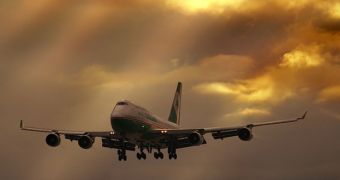Flying domestically is no longer a luxury in the UK, where the constant price cuts have made this a habit more than anything else. As plane tickets continue to cheapen, environmental advisors are sounding the alarm on the need to put a green tax on all flights, and in particular on the domestic ones, so that pollution is reduced and consumers are directed towards greener modes of transportation, reports in the British media say.
In recent years, tickets for domestic flights have seen a major reduction, which enables anyone to travel from one part of the country to the other. In doing so, airline companies are increasing their traffic, which, in turn, translates into impressive quantities of carbon dioxide released. Until now, the government has been coy about regulating aviation more strictly lest voters would be unhappy about it but, at the rate things are going, this will be necessary – and soon.
“The Government’s most influential environmental advisers have warned that flights will have to be heavily taxed in order to slow the growth in air travel. The Committee on Climate Change says that without tough measures, demand for flights could more than double over the next 40 years – releasing ‘dangerous’ amounts of carbon dioxide, it claims. The committee says the number of flights is forecast to treble from the current 230 million passengers a year to nearly 700 million by 2050 if the Government takes no action,” FlightMapping says of the measures proposed by environmentalists.
Britons “have become accustomed to taking long-haul holidays and short breaks, courtesy of cheap flights,” Professor Geoff Hammond, director of the Institute for Sustainable Energy and the Environment at the University of Bath, said recently, as cited by the same publication. “Governments are hesitant to place restrictions on these flights in case they induce a backlash from passengers, who are also voters. But, if we seriously want to mitigate global warming over the coming century, then aviation will need to play a role,” Prof. Hammond added.
However, many see the proposed method as nothing short of crippling for the economy. On one side, it’s not right to charge consumers extra for a flight. They work hard and deserve to be able to go on holiday if they so desire. On the other hand, forcing airline companies to adopt a different route than until now, especially when it goes against their best interest, means the state is interfering too much, past its attributions. Moreover, in order to do all of the above, the government first needs to have an alternative to offer consumers (namely, the option of traveling by train in the same comfort), and it doesn’t have that just yet.

 14 DAY TRIAL //
14 DAY TRIAL //